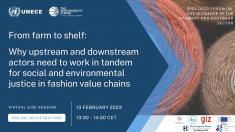
To mitigate sustainability risks, and to achieve a low-carbon transition, it is crucial to follow the thread along global value chains and to work in tandem from upstream to downstream stages in the garment and footwear sector. Here’s why:
No matter if cotton, wool, leather, cashmere, or even synthetic fibers, all clothing items originate from raw materials and, with this, mostly stem from a farm. The global production of fibers amounted to 110 million tonnes in 2018, including 32 million tonnes of natural fibres and 79 million tonnes of chemical fibres. Given the ever-increasing ecological footprint and social challenges, the fashion industry can only realize its full potential when consumption of garment and footwear, and production processes are properly addressed. Since agriculture is not only susceptible to climate change, but also a significant producer of global greenhouse gas (GHG) emissions, the future of textile and fashion is highly connected with the future of agriculture, and vice versa.
Therefore, the side event jointly organized by UNECE, ITC and ICS, as part of the 2023 OECD Forum on Due Diligence in the Garment and Footwear Sector, will connect key stakeholders from farm to fashion, including upstream and downstream actors, policymakers and standard-setting bodies. It will explore their different perspectives, such as challenges and opportunities to reach net-zero targets, and social and environmental objectives in fashion's agricultural supply chains, as the sector faces complex obstacles and lags behind on climate actions. The discussions will shed light on policy recommendations, and other demand and supply-side measures, that help strike a balance between economic and social objectives and GHG emission reduction.
By drawing on speakers’ experiences, the panel will address following guiding questions:
- What corporate and agricultural practices can help make garment and footwear supply chains more inclusive, regenerative and lower their emissions?
- Which specific policies and tools will be necessary, and have been proven successful in addressing climate action, and environmental and social protection, in garment and footwear value chains?
- What role do digital or innovative solutions play to boost transparency and traceability for more collaborative business models in textile and leather value chains?
This side session is organized in connection with the UNECE-ITC joint initiative for Enhancing Transparency and Traceability of Sustainable Value Chains in Garment and Footwear, implemented support of the European Union.
Programme
Moderation
- Elisabeth Tuerk, Director, Economic Cooperation and Trade Division, UNECE
Indicative Panel
- Muzaffer Turgut Kayhan, Chief Executive Officer, SÖKTAŞ
- Carole Hommey, General Manager, Initiative for Compliance and Sustainability (ICS) PPT
- Carlo Cici, Partner, Head of Sustainability Practice, The European House - Forum Ambrosetti
- Christian Hudson, EU Diplomacy Support G7 G20, GIZ PPT
Useful links
OECD Forum on Due Diligence in the Garment and Footwear Sector
Recording of the event

